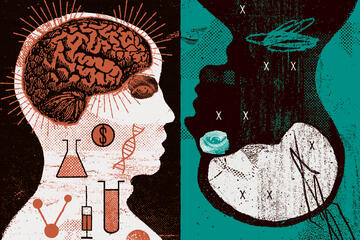Johns Hopkins University's School of Medicine and Krieger School of Arts and Sciences are collaborating on a new cross-university department of neuroscience that will leverage the expertise of brain science researchers across Johns Hopkins and bolster the university's global leadership in neuroscience research and education of new generations of scientists.
The new, interdivisional Solomon H. Snyder Department of Neuroscience will be co-located in both schools and aims to unify neuroscience research and education across the university. With faculty from both schools and other collaborating institutes, centers, and departments at Johns Hopkins, there will be more than 1,000 researchers working on brain-related research, 450 undergraduates majoring in neuroscience, and 121 neuroscience PhD students.
Combining the neuroscience programs supports the university's Ten for One goal of advancing cross-university programs that build on strengths and enhance collaboration opportunities for faculty, staff, and students. Additionally, it aligns with the School of Medicine's strategic focus on neuroscience and the Krieger School's renewal of its undergraduate programs.
"Johns Hopkins is a preeminent global hub for neuroscience expertise, and this partnership between the schools of Medicine and Arts and Sciences will harness the creativity and talents of our scholars and students to bring us closer to a comprehensive understanding of the brain," JHU Provost Ray Jayawardhana says. "The newly constituted department exemplifies our Ten for One commitment to breaking down barriers across the university, amplifying our longstanding leadership in this dynamic field and pushing the boundaries of neuroscience research and education to transform what's possible in fundamental discovery as well as disease treatment and care."
The new department will be led by Richard Huganir, Bloomberg Distinguished Professor of Neuroscience and Psychological and Brain Sciences and founding director of the Kavli Neuroscience Discovery Institute. Huganir has led the School of Medicine's neuroscience department since 2006 and is a pioneer in deciphering the brain's ability to store memories and learn.
Huganir and his research team were the first to isolate the SYNGAP1 gene, a DNA sequence that controls memory and learning. Mutations in the gene cause a range of neurodevelopmental disorders in children, including intellectual disability, autistic-like behaviors, and epilepsy. Huganir is leading research to discover treatments for children with SYNGAP1 mutations.
Among other notable discoveries, scientists at Johns Hopkins have:
- Deciphered how visual and olfactory signals are processed in the brain
- Discovered opiate receptors that reveal how the brain is affected by opiate drugs, revolutionizing the search for drugs that treat opiate addiction and pain
- Found photoreceptors in the eye that regulate the body's biological clock
- Discovered mechanisms underlying neuronal development, learning, and memory
- Uncovered the role of supportive glial cells in the brain
- Revealed molecules and genes linked with stroke, Parkinson's disease, Alzheimer's disease, autism, schizophrenia, and other neurocognitive conditions
"The brain is an incredible frontier of discovery in biomedical research," says Theodore L. DeWeese, dean of the medical faculty and CEO of Johns Hopkins Medicine. "Our neuroscientists have led this field for decades, investigating some of the most challenging mysteries of the brain, and this expansion of neuroscience across Johns Hopkins divisions will strengthen our ability to make new discoveries and train new generations of scientists."
Neuroscience is one of the university's most popular majors among undergraduates. The Krieger School will continue to manage the neuroscience major, and housing it in the interdivisional department will provide students with access to a wider range of pioneering experts who offer opportunities in teaching, mentorship, and research. The neuroscience department's highly ranked graduate program will continue to be managed by the School of Medicine.
"The strategic launch of this collaborative department will open new opportunities for our undergraduate students to conduct influential research with some of the world's leading neuroscience experts here at Johns Hopkins," said Christopher S. Celenza, dean of the Krieger School. "While the university is already renowned for its breakthroughs in the brain sciences, this new cross-divisional partnership will forge avenues for discovery specifically in the field of neuroscience."
All current faculty will remain appointed within their schools of origin. The new department has plans to further expand the number of faculty in brain-related research and to introduce a new master's program in neuroscience.
Posted in University News
Tagged neuroscience









